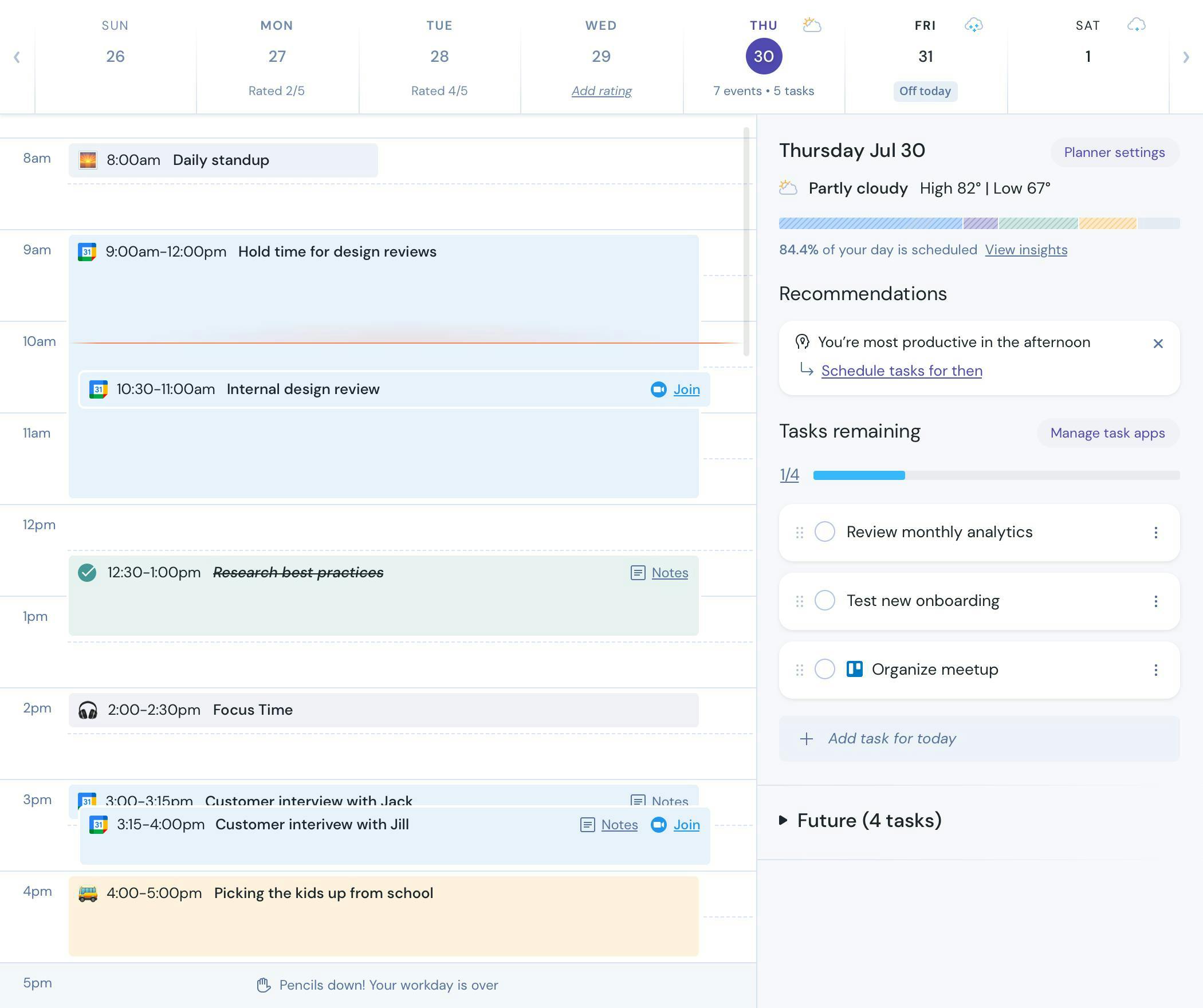Effective Time Management Skills 101

It’s about time we learned how to get things done in no time.
It’s simple. Managing time is managing life. Without organizational capabilities, you will find it extremely difficult to achieve your goals, whether it’s training for a 5K or getting that promotion.
If you don’t plan the day wisely, you can’t get everything done. Scale it up, you won’t meet deadlines, or many of the conditions needed for a productive week.
If you’re more than a little inefficient when it comes to organizing time, we’ve got you covered. You don’t have to be an eternal being, or Chronos, the Greek god of time… it’s a skill that anyone can learn, regardless of their profession. Why not begin to improve right now? After all, there’s no time like the present.
Is Time Management a Skill?
Time management is a life skill, in both senses: it helps you overcome the challenges of life, and it is a skill acquired through life experience. For anyone thinking that managing one’s time is an innate ability that only some possess, that’s dead wrong!
It only feels that way because time management demands more than a pinch of self-discipline. For many, this can be a catch-22 situation: you need discipline to manage time, but discipline is cultivated through time management. Once you break through that difficulty, though, you’ll find that time management allows you to hone healthy habits in many areas.
As a skill, it can be learned, refined and mastered. In this case, you’re training your ability to use time productively, in order to get things done and reduce stress. The entire process becomes far easier when you learn simple methods for prioritizing, scheduling and tracking important tasks.
What is Effective Time Management?
If you don’t know what effective time management looks like, how will you ever know whether you’re spending time well? Effective time management is the ability to maximize the potential of your time by using it in the most beneficial way possible.
The key to effective time management is to focus on the time you have available, rather than the countless things you want to do.
That’s where ruthless prioritization and smaller tasks join the mix. Do not spend time thinking about how you can get more time, but instead focus on doing more tasks in the time available.
What Are the Benefits of Time Management?
Why bother wrestling with time, you ask? Well, there are a smorgasbord of benefits to be enjoyed once you’ve taken control, and we’ve put them under three categories:
1. Less Stress
Time management strategies aren’t just about improving efficiency, they’re also greatly concerned with minimizing stress levels. An agenda and a clear plan help you feel less stressed by staying clearer on how you’re using time.
2. Less Fatigue
You’ve heard the motto work smarter, not harder; the same applies to time management. When you’re well organized, you are more likely to feel energized, and thus more likely to have the energy to do things you enjoy.
3. Less Procrastination
Once you’ve learned how much time you actually waste, and how productive you can be, you’ll run from procrastination as if it were the plague. Effective time management breeds discipline, strengthening your ability to resist distractions and limit procrastination.
4. More Work
Streamline your system and you’ll obviously get more done at work. It’s not simply trading quantity for quality; you can keep both by improving your time management skills, which will surely perplex your colleagues and get the attention of a boss.
5. More Free Time
When you’re organized and running at maximum efficiency, you can afford to schedule more activities into your day. This extends to your free time, too. For example, you may be able to fit in some cycling between afternoon appointments, if you’ve been task batching all morning.
6. More Confidence
Effective time management provides you with solid evidence of productivity that instills a sense of accomplishment. Not simply that, that feeling of control you gain – over time and life –positively impacts your confidence, so that you become generally surer of yourself.
7. Better Relationships
By effectively managing time, you have more spare time to allocate to other relationships. You’re able to spend more time with your loved ones thus improving your relationships with others.
8. Better Health
In the heat of the week, with deadlines and obligations, the first thing you’re likely to sacrifice is exercise and healthy eating. By getting better at time management, you can stay within your time limits without skipping meals or missing a workout, or any other aspects of life integral to your health.
9. Better Mood
As you control your time, you’ll find you can also control your mood. With less stress, you will naturally feel happier. With a boost in mood comes greater motivation, so you’ll be eager to reach new heights.
Oh, if you’re interested in how mood affects work, find out about the power of mood trackers
How Can You Improve Time Management Skills?
You’ve heard the advantages of time management, so you’re now probably wondering how exactly you can go about getting these goodies. Time management goes hand in hand with task management, and you’ll definitely need both for great success. You can learn these sub-skills (scheduling, organizing, prioritizing, goal-commitment, etc.) by following basic time management principles and implementing the appropriate productivity techniques.
You’ll need to learn how to prioritize, break down big projects into manageable objectives, delegate and recognize critical tasks amongst the many you have to do. When you set your priorities, you intrinsically know how you should be spending your time. We’ve collected six elements of time management, the fundamentals that you’ll need to conquer before mastering the skill:
1. Organize (Everything!)
We’ve been on about it a lot already, but staying organized is the power that you need to gain most immediately. It’s a factor that goes all the way down; it’s not just keeping a calendar, but also making sure your workspace stays tidy. Organization should touch everything, from a concise checklist to your weekly schedule, and even your long term ambitions.
“For every minute spent organizing, an hour is earned,” once professed founding father Benjamin Franklin. There’s no better way of organizing life than with a planner and calendar, making full use of complementary scheduling techniques. Every undefined hour of the day is at risk of being procrastinated. Further, having no pre-planned tasks to do puts you dangerously close to distractions.
Organize the lot and you can identify tasks for a to-do list before promptly completing them, making life much easier in the process.
Check out the different types of planner to see what suits you best.
2. Create a Schedule
Time management requires scheduling and scheduling requires a task-list. You first need to recognize what tasks you need to complete in a given timeframe. If you have both urgent tasks and important tasks, chances are they’re not – just ask ex-president Eisenhower and his decision matrix. You can usually eliminate a few tasks to make prioritizing and scheduling stress-free.
Once you’re aware of what you actually should be achieving, it’s time for some time-management systems like time blocking, allotting a set amount of time to each particular task. Remember that the basic formula of productivity is output over input, which usually equates to work over time. Therefore, effective time management is as much about knowing when to stop as when to start. You should be giving yourself realistic time limits and creating deadlines. Don’t try to keep them in mind, but actually schedule them in.
Scheduling is the most critical element of time management, so there’s no way you shouldn’t be keeping a daily schedule! It doesn’t have to look like it was designed by NASA; a simple arrangement that allows you to correspond time to explicit tasks is more than good enough.
3. Avoid Multitasking
It is understandably tempting to multi-task. After all, it seems you’re getting two for one, doubling down on work rate and reaping twice the reward. In actuality, multitasking is a myth… not like Bigfoot – we’re pretty sure multi-tasking exists. However, the speed increase that this technique appears to offer hasn’t ever been recorded.
Sadly, multi-tasking is far more likely to be a distraction and slow you down than help you work faster. It’s been shown, in various studies, that multi-tasking is simply less practical than we first thought. Not only does it lower the quality of work, increasing the likelihood of error, but it also is fairly taxing on your brain, which would much prefer to maintain a single focus.
We just aren’t sophisticated enough to process multiple streams of information simultaneously. The human brain is “not wired well to multi-task,” as Earl Miller, professor of neuroscience at MIT, once noted. What we consider multi-tasking is really rapid task-switching, colloquially referred to as mental juggling, which does no good for our time management.
4. Learn to say NO
In essence, prioritization is saying no to one thing in favor of another, it is an unwavering prerequisite for properly managing time. Say yes to everything and you’ll swiftly go insane by exhaustion. Although our modern industrialist ideologies don’t often remind us of it, time is a precious and tradable resource (think gold bars or baseball cards) and you should carefully consider how you spend it.
By all means help others with their work. In fact, going out of your way to assist others is instrumental in fostering a healthy team spirit. Yet, there must come times where you must say no, not just to others but also to yourself. Sacrificing immediate desires for more substantial gains later on is a core principle for success, and you should manage your time with that in mind.
Just like time management, learning to say no is an important life skill, one of numerous examples that can allow you to be more persuasive in a job. Delegating, collaborating and motivating, almost always required for projects, are hard to do without solid communication skills.
5. Productivity Systems
There are a million productivity systems out there, so it can be cumbersome to filter through to the best ones, exactly why we’ve done it for you! Firstly, you can try to eat the frog, a method that requires you to tackle your most intimidating and difficult task of the day, first thing. You can easily integrate this method into your scheduling, ensuring that you start the day with a big win!
A second example, and one of the best time management techniques, is the Pareto Principle, commonly called the 80/20 rule. It’s the idea that 80% of your results (output) come from 20% of your input (actions). In other words, you can dramatically increase your time management and productivity by rerouting the time you would’ve wasted to the tasks that really produce results.
Thirdly, a more holistic approach by journaling. The weekly and monthly spreads found in, say, a bullet journal provide regular encouragement for users to manage their time effectively. You can create simple or refined schedules, with great emphasis on progress tracking and personal reflection.
Use Friday to Manage Your Time
The main issues that people have when managing time are:
1) Defining the task to be accomplished (adds value to career goals/personal aims)
2) Keeping themselves motivated
3) Resisting distractions or procrastination
4) Tracking time spent to assess the results achieved.

While no time management apps can rummage around in your head and define your goals for you (for that, you’ll need the goal-setting guide), Friday can certainly come to the rescue with the rest.
Use the Friday planner to see all of your meetings, phone calls and appointments, and integrate your existing work apps--like Slack, Teams, Google Calendar, Microsoft Outlook, Asana, Trello, Todoist, ClickUp, and more.
By using Friday and its integrations, you create a stellar schedule that is synced together. Track all of your tasks from the most popular project management apps.
Drag and drop your tasks into the times on your calendar to help manage your time.
Don't Chase Unrealistic Time Management Expectations
It’s deceptively simple, all things considered. Time management strategies are about knowing your priorities and never wasting time, whether it’s straight-up, TV-binging procrastination or spending time on seemingly productive tasks that turn out to be useless.
One last piece of advice: don’t get lost chasing unrealistic time management expectations. Contrary to what a production line manager might wish for, there is only so much successful people can achieve in a day. Of course, you should strive to reach peak productivity, but don’t overdo it.
Brilliant time management is a continuous trade between time and value. It’s also an ongoing self-assessment, the little voice that nags you when sitting around and cheers you while working. It’s inside all of us, so we all have the potential to become better at time management. With a little organizing and scheduling, you can grow that inner voice into a mighty bellow. Become the company Chronos, with a godly grasp on office hours!


